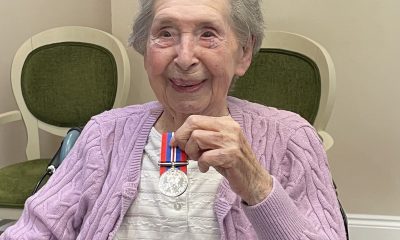Swapping sugar for sweeteners can improve weight loss: study
Researchers found the positive effect lasts for at least one year after rapid weight loss in adults.
Published
1 month ago onBy
Talker News
By Sharin Hussain via SWNS
Swapping sugar for sweeteners can improve weight loss, according to a new study.
Replacing sugar-sweetened food and drinks with low or no energy sweetened products can help weight control, say scientists.
The Danish research team found the positive effect lasts for at least one year after rapid weight loss in adults - without increasing the risk of type 2 diabetes.
Study lead author Professor Anne Raben, of the University of Copenhagen, said: “Weight maintenance after weight loss is difficult to achieve, and our findings support the use of sweeteners and sweetness enhancers (S&SEs) found in many foods and beverages worldwide as alternatives to sugar-sweetened products to help manage weight control in adults with overweight.
“The findings also provide important information to address the controversies about potential adverse health effects. Until now, safety data have generally come from animal studies using sweetener doses far above the usual intake in humans.”
The study also found that consuming S&SEs made for a positive mood, and lower craving for sweet food at six months than the sugar group.
Researchers from SWEET, sweeteners and sweetness enhancers project, spent a year analysing adults and children who were overweight or obese in a randomized controlled trial.
These participants were from Northern, Central and Southern Europe.
They completed questionnaires at two, six and 12 months to assess the effects of S&SEs on diet satisfaction and more.

The trial recruited 341 adults aged 18 to 65, who are overweight or obese with 71 per cent women, and a body mass index above 25 kg/m2.
In addition a group of 38 children aged six to 12 were recruited with 60 per cent girls with a 85th percentile BMI from Denmark, Spain, Greece, and The Netherlands through web pages, social media, newspapers and registries.
During the first two months of the trial, adults were instructed to follow a low-energy diet called the Cambridge Weight Plan with the aim of achieving at least five percent weight loss.
The children received dietary advice to maintain body weight.
They were placed in two groups, on a healthy diet with less than 10 percent of energy from added sugar by S&SE or a healthy diet with less than 10 percent of energy from added sugar, excluding S&SE.
They measured change in weight, BMI by age and risk markers for type 2 diabetes and cholesterol.
They discovered that the intake of sugar-rich foods and beverages declined in both groups over the trial, but significantly more in the S&SE than in the sugar group.
Of 341 adults, 277 successfully lost five percent or more body weight after the two-month weight loss period.
They found that those consuming S&SEs had slightly better weight loss maintenance after one year than the sugar group, with an average weight loss of 7.2kg compared to 5.6 kg.
In 203 participants, risk markers for type 2 diabetes and cardiovascular disease did not differ between the groups.
There was no difference in BMI for age for 22 children.
Adults in the sugar group had greater liking for sweet over savoury foods at six months and 12 months.
However, there were no differences between the groups in reported physical activity or quality of life.
Co-lead author, Dr. Clarissa Dakin from the University of Leeds said: “Our findings suggest that the inclusion of low/no energy sweetened products may benefit children who show high levels of uncontrolled eating.
“For these children, being allowed to consume S&SEs led to lower levels of uncontrolled eating at 12 months in comparison to the children who were not allowed to consume S&SEs.
“This benefit was not found for children with lower levels of uncontrolled eating.
"Together, these findings provide important insights for the ongoing re-evaluation of food additive sweeteners by the European Food Safety Authority and other health agencies worldwide.”

A 2023 WHO review suggested that replacing free sugars with non-sugar sweeteners did not appear to help with weight control in the long term, and could raise the risk of various health problems.
S&SEs have very high sweetening power but contribute little or nothing to energy intake.
Natural and synthesised sweeteners, such as aspartame saccharin, are added to products to cut the sugar content, and are consumed by millions of people around the world every day in soft drinks, desserts, and breakfast foods.
However little is known about the long-term effects of S&SE on eating behaviour.
Professor Jason Halford, Head of the School of Psychology at the University of Leeds added: “The use of low calorie sweeteners in weight management has been questioned, in part because of the link between their use and apparent weight gain in observational studies, however, increasingly it is becoming apparent that is not the case in long term studies.”
Coordinator of the SWEET project, Professor Jo Harrold concludes: “The results of this long term trial support the use of S&SEs instead of sugar in food and beverages to aid weight control.
"The evidence suggests there are no grounds for concern in regard to the safety of these products on sweet preference, appetite, or glucose control.
“These results add to the body of evidence which indicates that S&SEs can play a positive role in weight management when used judiciously.
"Other aspects of the project have alluded to barriers that impede the development of healthier, low-energy products and a resulting need to review policy and regulatory approaches.
“The SWEET symposium will offer an opportunity to make industry representatives, consumers and policy makers aware of the potential benefits of S&SEs for public health and safety, obesity and sustainability.”
The research is expected to be shared at The European Congress on Obesity in Venice in May.
Stories and infographics by ‘Talker Research’ are available to download & ready to use. Stories and videos by ‘Talker News’ are managed by SWNS. To license content for editorial or commercial use and to see the full scope of SWNS content, please email [email protected] or submit an inquiry via our contact form.
You may like


New superfood may help with diabetes and obesity


Researchers find minimally invasive solution for thyroid cancer


Muhammed Ali’s ‘Thrilla in Manila’ shorts could fetch millions at auction


Snoring and high blood pressure can simply be prevented with this


Human brains are getting bigger, here’s why that’s good news


Study says knitting can help with depression, anxiety and stress
Other Stories


Blood test can detect signs of knee condition 8 years before X-rays
Early detection could lead to treatments that slow the progression of the most common form of arthritis.


Man captures ultra rare albino squirrel on camera
The white squirrel has red eyes so is thought to be an albino squirrel.


Adorable dog kicks his leg while he walks
A video captured the pup bouncing along the street of his native China.


Woman with rare ‘Sleeping Beauty’ condition sleeps every four hours
She was diagnosed at age 18 after years of struggling to stay awake in school and nodding off during class.


97-year-old veteran receives WWII service medal 80 years later
"We’re all so proud of Eve."
Top Talkers

 Parenting1 week ago
Parenting1 week agoSingle mom details struggles of feeding her 12 kids

 Lifestyle1 week ago
Lifestyle1 week agoWoman regrets her tattoo nightmare: ‘It’s horrendous’

 Health5 days ago
Health5 days agoNew study reveals ‘old age’ begins later than it used to

 Wildlife4 days ago
Wildlife4 days agoClever elephant returns visitor’s shoe that fell into enclosure

 Good News5 days ago
Good News5 days agoDisabled student takes first steps in 10 years on graduation stage

 Animals18 hours ago
Animals18 hours agoAdorable dog kicks his leg while he walks

 Entertainment2 days ago
Entertainment2 days agoWhat is the perfect movie length?

 Broadcast24 hours ago
Broadcast24 hours agoAre allergies interfering with your social life?
